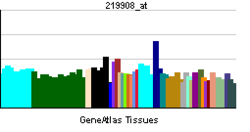- DKK2
-
Dickkopf homolog 2 (Xenopus laevis) Identifiers Symbols DKK2; DKK-2 External IDs OMIM: 605415 MGI: 1890663 HomoloGene: 8681 GeneCards: DKK2 Gene Gene Ontology Cellular component • extracellular region
• extracellular spaceBiological process • multicellular organismal development
• negative regulation of canonical Wnt receptor signaling pathway
• positive regulation of canonical Wnt receptor signaling pathwaySources: Amigo / QuickGO RNA expression pattern 
More reference expression data Orthologs Species Human Mouse Entrez 27123 56811 Ensembl ENSG00000155011 ENSMUSG00000028031 UniProt Q9UBU2 Q8BFW0 RefSeq (mRNA) NM_014421 NM_020265.4 RefSeq (protein) NP_055236 NP_064661.2 Location (UCSC) Chr 4:
107.84 – 108.2 MbChr 3:
131.75 – 131.84 MbPubMed search [1] [2] Dickkopf-related protein 2 is a protein that in humans is encoded by the DKK2 gene.[1][2]
This gene encodes a protein that is a member of the dickkopf family. The secreted protein contains two cysteine rich regions and is involved in embryonic development through its interactions with the Wnt signaling pathway. It can act as either an agonist or antagonist of Wnt/beta-catenin signaling, depending on the cellular context and the presence of the co-factor kremen 2. Activity of this protein is also modulated by binding to the Wnt co-receptor LDL-receptor related protein 6 (LRP6).[2]
References
- ^ Krupnik VE, Sharp JD, Jiang C, Robison K, Chickering TW, Amaravadi L, Brown DE, Guyot D, Mays G, Leiby K, Chang B, Duong T, Goodearl AD, Gearing DP, Sokol SY, McCarthy SA (Dec 1999). "Functional and structural diversity of the human Dickkopf gene family". Gene 238 (2): 301–13. doi:10.1016/S0378-1119(99)00365-0. PMID 10570958.
- ^ a b "Entrez Gene: DKK2 dickkopf homolog 2 (Xenopus laevis)". http://www.ncbi.nlm.nih.gov/sites/entrez?Db=gene&Cmd=ShowDetailView&TermToSearch=27123.
Further reading
- Wu W, Glinka A, Delius H, Niehrs C (2001). "Mutual antagonism between dickkopf1 and dickkopf2 regulates Wnt/beta-catenin signalling.". Curr. Biol. 10 (24): 1611–4. doi:10.1016/S0960-9822(00)00868-X. PMID 11137016.
- Mao B, Wu W, Li Y, et al. (2001). "LDL-receptor-related protein 6 is a receptor for Dickkopf proteins.". Nature 411 (6835): 321–5. doi:10.1038/35077108. PMID 11357136.
- Li L, Mao J, Sun L, et al. (2002). "Second cysteine-rich domain of Dickkopf-2 activates canonical Wnt signaling pathway via LRP-6 independently of dishevelled.". J. Biol. Chem. 277 (8): 5977–81. doi:10.1074/jbc.M111131200. PMID 11742004.
- Brott BK, Sokol SY (2002). "Regulation of Wnt/LRP signaling by distinct domains of Dickkopf proteins.". Mol. Cell. Biol. 22 (17): 6100–10. doi:10.1128/MCB.22.17.6100-6110.2002. PMC 133995. PMID 12167704. http://www.pubmedcentral.nih.gov/articlerender.fcgi?tool=pmcentrez&artid=133995.
- Strausberg RL, Feingold EA, Grouse LH, et al. (2003). "Generation and initial analysis of more than 15,000 full-length human and mouse cDNA sequences.". Proc. Natl. Acad. Sci. U.S.A. 99 (26): 16899–903. doi:10.1073/pnas.242603899. PMC 139241. PMID 12477932. http://www.pubmedcentral.nih.gov/articlerender.fcgi?tool=pmcentrez&artid=139241.
- Mao B, Niehrs C (2003). "Kremen2 modulates Dickkopf2 activity during Wnt/LRP6 signaling.". Gene 302 (1-2): 179–83. doi:10.1016/S0378-1119(02)01106-X. PMID 12527209.
- Clark HF, Gurney AL, Abaya E, et al. (2003). "The secreted protein discovery initiative (SPDI), a large-scale effort to identify novel human secreted and transmembrane proteins: a bioinformatics assessment.". Genome Res. 13 (10): 2265–70. doi:10.1101/gr.1293003. PMC 403697. PMID 12975309. http://www.pubmedcentral.nih.gov/articlerender.fcgi?tool=pmcentrez&artid=403697.
- Gerhard DS, Wagner L, Feingold EA, et al. (2004). "The status, quality, and expansion of the NIH full-length cDNA project: the Mammalian Gene Collection (MGC).". Genome Res. 14 (10B): 2121–7. doi:10.1101/gr.2596504. PMC 528928. PMID 15489334. http://www.pubmedcentral.nih.gov/articlerender.fcgi?tool=pmcentrez&artid=528928.
- Kuphal S, Lodermeyer S, Bataille F, et al. (2006). "Expression of Dickkopf genes is strongly reduced in malignant melanoma.". Oncogene 25 (36): 5027–36. doi:10.1038/sj.onc.1209508. PMID 16568085.
Categories:- Human proteins
- Chromosome 4 gene stubs
Wikimedia Foundation. 2010.
